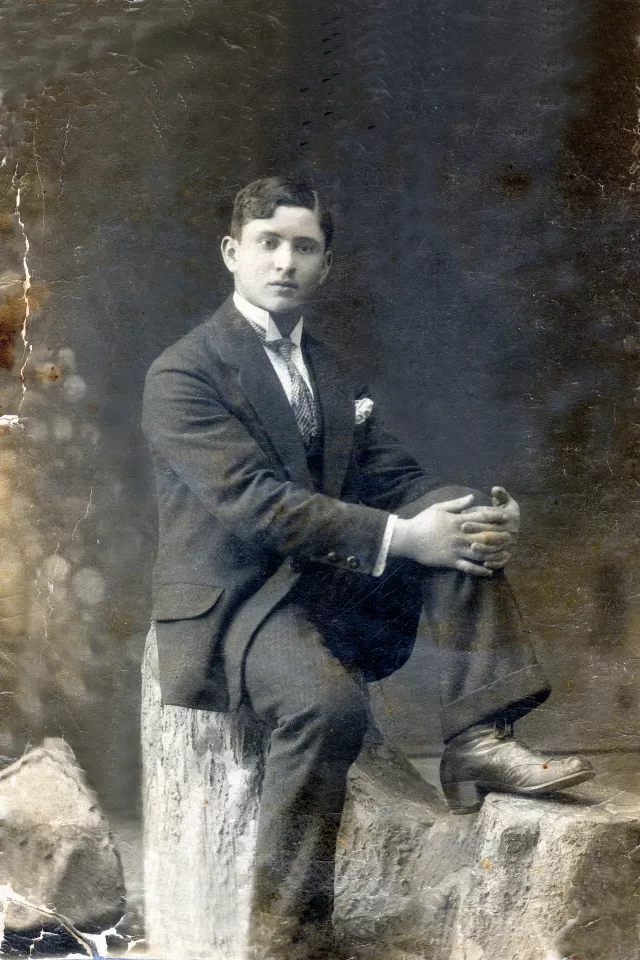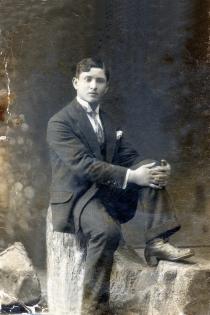Here you can see my father Matvey Alperovitch. This photo was taken in early 1920s, place unknown.
My dad's father David Abramovitch Alperovitch was born in 1856. I don't have any information about his brothers and sisters. It seems, he had a brother Michael, who stayed to live on territory of Poland after [October] Revolution.
After World War II his son Jacob together with his children came to us, to Bologoye [town in 300 kilometers to the South from Petersburg].
My father's Mom, she died very early of some heart decease, was called Anna or Khaya, they named me after her, in her honor. Then grandfather married for the second time.
The second grandmother, named Itka Semenovna, was of the same age as grandfather's elder son, she was something like thirty years younger than Granddad, but children liked her very much.
Grandfather was a peasant, serednyak [representative of the middle class, as far as 'seredina' is 'middle' in Russian], he lived in Lipsk village of Begoml district, which was situated in Borisov uezd [in Russia they divided regions into the small parts, called 'uezds'] of Belarus [Begoml town, 150 kilometers to the North from Minsk, is a part of Vitebsk region today].
Grandfather had eleven children. In 1905 his elder children from the first wife left for America [after Revolt of 1905 many Jews emigrated from Russia to the USA or Palestine]. Grandfather had the only daughter Maria (at home they called her Mura) from his second wife.
Grandfather wore tallit. And he had the tefillin too. No doubt, that he and grandmother Itka followed Jewish traditions. I remember, the way I helped them to bake matzah, being a schoolgirl.
But when we went to evacuation we found out that he isn't such an orthodox. While we were going in heated goods van, mother made us sandwiches with lard and onions.
Grandfather asked us: 'Children, what tasty things do you eat?' We replied: 'Grandfather, this is bread with lard'. - 'Ye... it smells very good'. - 'Grandfather, just try it'. He doubted and then said: 'We [Jews] cannot eat pork'. 'Don't worry, grandfather.
And finally we gave him some sandwiches. Later, when we came to Chuvashi [an autonomic republic in Middle Povolgi] he bought two small pigs and began to eat pork heartily.
My father Matvey Davidovitch Alperovitch was born in 1898. Among those children, who stayed (those, who didn't leave for America), father was the oldest one, sisters Ghenya, Rachel, Ghitah and step-sister Maria were younger, than he.
He didn't communicate a lot to his American relatives, but even after the October Revolution father's sister Ghenya wrote to them. I don't know anything about their lives over there: no what they were, neither where exactly they lived.
Of course, Yiddish was his mother tongue, but at home father spoke both languages: Russian as well as Yiddish. He wasn't religious person, not at all. I can't recall that he would observe Sabbaths or pray. Perhaps, he had some Jewish education, but he never told me if he studied in cheder, or in regular elementary school. I can't even say what kind of education did he get; maybe, they had no schools in Begoml district?
My parents got to know each other in the beginning of 1920s. That was the Civil War. My father was in army, he served in a sanitary company. Their sanitary train went to Staraya Russa; father went for a walk, found the place, where they sold the kvass, and came inside the house.
Mother washed the floors; she interrupted the work, washed her hands and gave him some kvass. So they met, and began to talk. Then, together with his unit, he left, but they continued to write each other. And, after he demobilized from army, mother went to Belarus, to that village, called Lipsk.
There they registered their relations in 1922, but the large Jewish wedding happened in Staraya Russa later, some when in 1923, even after my birth.
All his life he was a regular civil servant. For example, in Bologoye father was a director of 'Koghsyrie' - small organization, part of Prom cooperation, where peasants from neighborhood villages brought skins. The job was very little paid, we lived very modest.



















